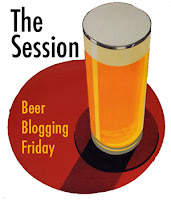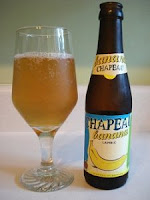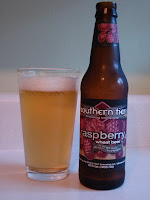This article was originally written in July 2006 for the now-defunct food and drink website Gremolata. It was re-published here in September 2011, but back-dated to appear in the blog archives close to its original publication date.
Fruit beers have it pretty rough. Ask a mainstream beer drinker what they think of them, and if they’re not completely baffled and/or disgusted by the concept, they might be reminded of Twist Shandy, the horrible lemon-flavoured beer cooler that Labatt produced in the 80s and 90s. Ask a beer geek for their opinion and they’ll often dismiss them as tarted up gimmick beers made for people who don’t really like beer, or as something to keep their girlfriend/wife happy at their favourite beer bar while they themselves drink a big Imperial Stout or uber-hoppy Double IPA. (I should mention before going any further that my wife calls me a “girlie man” when I drink fruit beers, and counts St. Ambroise Oatmeal Stout and Great Divide Oak-Aged Yeti Imperial Stout amongst her most favourite things ever, so don’t believe the stereotypes!)
It’s unfortunate that such animosity and attitude exists on both sides of the beer-drinking spectrum, as there are a multitude of fruit-based beers being brewed around the world, and not all of them are of the sickeningly sweet alco-pop variety. In fact, serious beer aficionados hold some of them in very high regard, such as Quelque Chose, a strong cherry beer from Quebec’s Unibroue <> that is meant to be served heated, and Raspberry Eisbock, a 10.6% elixir brewed in Michigan by Kuhnhenn Brewing that currently sits at number 10 on the hit parade on RateBeer.com.
If you’re interested in exploring fruit beers, the first thing to know is that the addition of fruit flavour to beer can be accomplished in one of two ways: fruit can be added during the fermentation process, or fruit juice or extract can be added to the beer after it has been fermented. As you might expect, the former method is generally considered to produce a higher quality result, but it’s also much more difficult as the fruit sugars add an extra level of complexity to the already volatile fermentation process. So the majority of fruit beers use the second method, which usually results in a sweeter and less complex end product. As noted in a recent blog post on the topic by Toronto beer scribe Stephen Beaumont, there are some quite palatable examples of beers made using the juice/extract method, and they often appeal to drinkers who are used to heavily sweetened wine- and spirit-based coolers. But it’s the fruit beers produced using the full-fermentation process that tend to receive the most plaudits from hardcore beer geeks.
There are a number of fruit beers available at the LCBO and Beer Store, some of them on a year round basis, and some as part of the LCBO’s current summer beer promotion. While most of them fall on the sweeter side of the flavour spectrum, there are a couple that show a bit more character and complexity. Since most of them are available in single bottles, you can easily grab a bunch and have a tasting with a few friends to find your favourites.
In this post, I’ll cover the fruit beers in the current LCBO seasonal release, while my next post will look at those that are available in Ontario on a regular basis.
Belhaven Blueberry ($3.10/500 mL, 4.8% abv, LCBO 676866)
I’m a sucker for blueberries, so I was really looking forward to this one, doubly so since I’ve enjoyed some of the other beers I’ve tried from Scotland’s Belhaven Brewery. Given their strength in producing traditional ales, I was surprised to find that the base beer used here is a rather pale Pilsner-style lager with not a lot of character. As a result, the predominating characteristic of this one is the blueberry flavour, which was quite fresh and natural tasting in the first bottle I tried, but a bit stale in one that sat in the fridge for a couple of weeks. It’s somewhat one-dimensional, but crisp and refreshing, making it a decent hot weather patio beer.
Floris Ninkeberry ($2.65/330 mL, 3% abv, LCBO 479154)
The Floris line of flavoured wheat beers from Belgium’s Brouwerij Huyghe is infamous among beer lovers, with the Chocolat version having the dubious distinction of once being ranked the worst beer in the world on RateBeer. Thankfully, the Ninkeberry variation isn’t quite so awful, but it’s nothing to write home about either. It pours a nice orange-gold colour, with a good sized white head. The aroma and flavour are both chock full of sweet peach, mango and non-classifiable berry notes. When the beer is cold, it’s not bad, but as it warms, it starts to feel like you’re drinking a liquid Life Saver. It’s rumoured that this is intended to be a beer for children, which would definitely explain both the low alcohol and the candy-like qualities.
Fuller’s Organic Honey Dew ($3.50/500 mL, 5% abv, LCBO 676858)
OK, it’s not exactly a fruit beer, but it’s flavoured and on the sweet side, so I thought it would be worthwhile to include on this list. As it comes from Fuller’s, the same UK brewery responsible for the fantastic London Pride and London Porter, I was expecting a fair bit from this beer, and I wasn’t disappointed. The colour is a clear, bright honey-golden, and it has a mild, fresh aroma of honey, hay and earthy malt. The body is light and crisp, and the flavour is simple but fresh and pleasant, with notes of biscuity malt, honey sweetness, and a subtly hopped finish. While it’s not my favourite of the bunch, it’s certainly the most quaffable, and would be a fine session beer for a mild summer’s evening.
Liefmans Frambozenbier ($4.95/375 mL, 4.5% abv, LCBO 439984)
While it’s brewed using the juice-added method, this raspberry beer from Belgium’s Huisbrouwerij Liefmans rivals the complexity and quality of many fully fermented fruit beers. There are two main reasons for this: they use the juice of whole fresh raspberries pressed just before mixing, and the base beer is their renowned Flemish Sour Ale, Liefmans Goudenband. The result is a beer that has the aroma and flavour of fresh, tart raspberry compote, backed up with some oak and earthy malt, and a lingering sour finish. (If you’d like to compare it to the unflavoured version, there are still a few bottles of Goudenband kicking around from the LCBO’s spring beer promotion.)
St. Louis Premium Kriek ($tba/4 x 250 mL, 3.2% abv, LCBO 676890)
At the time of writing, this cherry beer from Belgium’s Brouwerij Van Honsebrouck had yet to appear on store shelves, or even in the LCBO’s online inventory. While I try to keep an open mind, my expectations for this one are low due to the poor quality of St. Louis Gueuze and the fact that it will be sold in cans, a package that is suitable for many styles of beer but not a traditional Kriek, suggesting that this will likely be of the sweetened variety.
In closing I should mention that if flavoured beers just aren’t you’re thing, there are two other beers in the summer promotion that you may find more to your liking. Christoffel Blond ($2.30/300 mL, 6.0% abv, LCBO 696955) is a golden-hued Pilsner from Bierbrouwerij St. Christoffel of The Netherlands that has a spicy, herbal hoppiness that makes it fantastic for steaming mussels and to drink with them once they’re done, of course. Goldings Summer Hop Ale <> ($3.30/500 mL, 4.7% abv, LCBO 676874) from Britain’s Shepherd Neame is a light golden ale with some soft floral notes, but it’s unfortunately been packaged in clear bottles, making it prone to skunkiness thanks to the open shelves and harsh lighting at most LCBO outlets. So if you’re going to get some Goldings, I highly recommend that you grab the bottles from an unopened case if at all possible.
Next post – Fruit Beers, Part Two: The year-round selection.
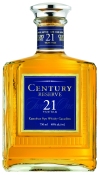 Century Reserve 21 Year Old
Century Reserve 21 Year Old Lindemans Gueuze Cuvée René
Lindemans Gueuze Cuvée René
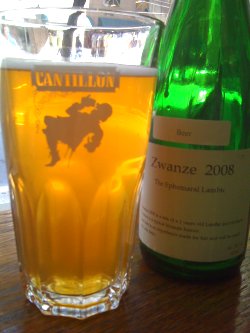 Earlier this evening, I visited
Earlier this evening, I visited 